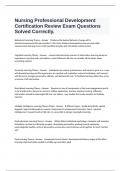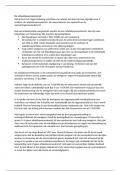Nursing Professional Development
Certification Review Exam Questions
Solved Correctly.
Behaviorist Learning Theory - Answer Produces the desired behavior change with +
stimulus/environment-Ed role provides (+ this )John Watson developed-focuses on observable
measurement-learning occurs with repetition practice and immediate reinforcement
Cognitive Learning Theory - Answer Learner directed active process of information learning based on
experiences, learning style, perceptions ,social influences Ed role: to consider all the above when
presenting content
Humanist Learning Theory - Answer Individuals are unique, autonomous, and wants to grow in a + way.
self directed learning and life experiences are needed; self evaluation, internal motivation, self concept,
self discovery, changes personality, attitude, and behavior.Ed role: To facilitate learning rather than serve
as source of all information
Brain Based Learning Theory - Answer Requires to use all components of the brain engagement goal is
to be transferred to long term memory. Utilizes application, practice, booster learning, reflection,
information should be meaningful Ed role: use videos , case studies that evoke emotion to facilitate
memory
Multiple Intelligence Learning Theory/Styles - Answer 8 different types = bodily-kinesthetic ,spatial
linguistic, logical mathematical, musical, interpersonal, intrapersonal naturalist. moral , spiritual,
intelligences ( Howard Gardner) Ed role: to use profile to design meaningful learning
Psychodynamic Learning Theory - Answer (Alfred Alder)-Individual psychology; maintains self assertion
limitations can lead to inferiority complex- developing personality, working toward superiority,
psychologically healthy, unity of personality-unconscious and conscious work together to reach "perfect
self"
Peck Learning Theory - Answer Developed from Erickson's developmental theory-stages of life affect
learning-important tasks needed in middle age and older adult
, Attribution Learning Theory - Answer (Bernard Weiner) focuses on explaining behavior-people attribute
cause of behavior classified as: locus of control (internal/external), stability of causes, and ability to
control causes.
Cognitive Dissonance Learning Theory - Answer (Leon Feininger) When you know cognitive knowledge
but still do not do the behavior change-. Smoker example
Theory of Social Learning - Answer (Bandura) Learning develops from observation and organizing and
rehearsing behaviors modeled. Conditions needed: attention, retention, reproduction, motivation.
Example preceptor
The Health Belief Model (HBM) Learning Theory - Answer Used to predict health behavior -states a
person tries to avoid negative consequences 6 perceptions: susceptibility, severity, benefit, barriers,
action cues, self efficacy. Education focuses on negative consequences to change behavior . Example quit
smoking to avoid HF,PD
Learning Theory of Reasoned Action - Answer (Fishbein/Ajzen) based on idea that actions can be
predicted according to the person's attitude toward the action and perceptions of action. concepts:
attitude, subjective norms, behavioral intention.
Learning Theory Planned Behavior - Answer (Ajzen) evolved from Reasoned Action theory-more
successful in predicable action added concept of perceived behavior control beliefs are central and
interact with intention, action, confidence to make + outcome looks at emotions such as fear, etc.. in
predicting
Adult Learner Strategies (Knowles-Theory of Andragogy) - Answer Ed Role: recognize other
responsibilities may interfere with readiness to learn and participation need to be flexible in schedule,
teaching strategies, and options to make it convenient to learner. Adults want to be a part of planning,
bring experiences, need to value KSA, give time to work through learning, provide positive feedback,
assess motivation, respond to behavioral cues Voluntary learner, problem centered, knowledable, self
directed
Principles of Adult Learning (Knowles) - Answer practical and goal oriented-Self directed responsible for
own learning, knowledgeable-bring life experiences, Motivated-respond to both intrinsic and extrinsic





